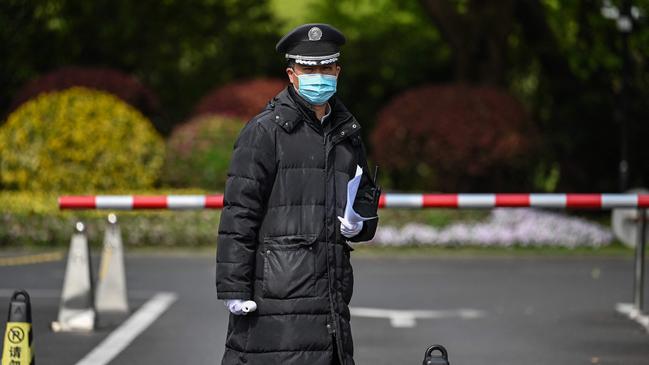China fires guns off the Taiwanese coast as US delegation visits
China’s People’s Liberation Army began six days of gunfire in the waters near Taiwan.

An unofficial delegation representing the Biden administration in Taiwan has been welcomed by a smiling President Tsai Ing-wen and a gun-toting People’s Liberation Army as tensions rise in one of the world’s most dangerous flashpoints.
The PLA Navy began six days of training with live gunfire on Thursday in waters near Taiwan, in what Beijing said was a clear message to Taipei and Washington.
“We are determined to stop Taiwan independence and to stop Taiwan from working with the US. We are doing it with action,” said Beijing’s Taiwan Affairs Office spokesman, Ma Xiaoguang.
The pointed military exercises began on Thursday as former US senator Chris Dodd and former deputy secretaries of state Richard Armitage and James Steinberg met with Ms Tsai, who Beijing accuses of promoting independence for what it considers a wayward province.
The PLA’s shooting drills will continue as Japan’s Prime Minister, Yoshihide Suga, on Saturday (AEST) becomes the first leader to visit President Joe Biden in Washington.
Mr Suga is reportedly under pressure to join the US President and publicly commit to support Taiwan during his visit to Washington, which is being closely watched by Beijing.
Taiwan has not been mentioned in a joint US-Japan leaders statement since 1969, before the US formally recognised the People’s Republic of China and reduced Taiwan to non-country status.
Much of Japan’s business community is wary about worsening relations with the country’s biggest trading partner. Although some hawkish members of Mr Suga’s government, including vice-defence minister Yasuhide Nakayama, said Japan should follow the US’s lead and send a similar delegation to Taiwan.
President Xi Jinping’s administration accused America of undermining the status quo in the island as the Trump administration more than doubled the amount of arms sold to Taiwan compared to the Obama administration.
Beijing-based think tank Grandview in a recent report on US-China relations said the increase in arms sales had encouraged “unrealistic and unnecessary political adventurism on the island”. “Beijing’s relatively more hardline approach toward Taiwan in recent years has been a reaction to the more visible pro-independence movement on the island,” the report said.
The three-day trip by the former US officials was kept secret until Wednesday, hours before Mr Biden’s climate change envoy, John Kerry, arrived in Shanghai in the first visit to China by a senior official in the new administration.
Mr Kerry on Thursday met Chinese counterpart Xie Zhenhua, with whom he worked closely on climate policy during the Obama administration.
Mr Ma said the US administration’s description of the delegation visiting Taiwan as “unofficial” was “just their lie for deceiving people”.
“We oppose any form of official exchange between the US and Taiwan, no matter how it’s presented, no matter what excuses are used as a cover-up,” he said.
Chen Chien-jen, until last May the vice-president of Taiwan, said that as well as showing support, the three retired US officials would allow Mr Biden to send a message to caution Taipei against taking action that could provoke Beijing.
“The Biden administration may want to ask Taiwan to be more prudent in handling cross-strait relations,” he said.
Most analysts covering the region believe full-blown military conflict in the island is currently unlikely, although many are increasingly concerned about the high level of military exercises in the area.
Others are concerned about Beijing attempting a takeover using greyzone measures short of war.
Bonnie Glaser, an expert on Taiwan relations at the Centre for Strategic and International Studies, said the deep interdependence of the mainland Chinese and Taiwanese economies remained an important stabiliser.
“The two sides of the strait are locked in a state of economic co-dependence, with China increasingly reliant on Taiwan for technology,” the Washington-based analyst argued in a new article in Foreign Policy.
“And with the United States imposing restrictions on sales to China of both semiconductors and the technology to make them, Beijing is facing vulnerabilities that make economic relations with Taiwan even more important.”




To join the conversation, please log in. Don't have an account? Register
Join the conversation, you are commenting as Logout